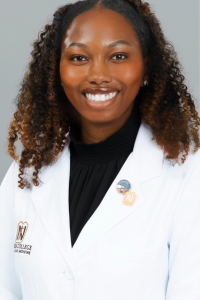Finding My Voice in Medicine
Published September 09, 2025
Inside OME

By Ayanda Chantelle Mkhize, OMS II, Noorda College of Osteopathic Medicine
One of my goals in medical school
has been to find my voice. I have always believed that my quiet presence allows
me to listen deeply, observe carefully and form genuine connections, but I also
know that the best advocate for my abilities must be me. During my first year
of medical school, I attended an event surrounded by female physicians and was
amazed as they shared their trials and triumphs in medicine. They spoke with
confidence and generosity while offering mentorship, but I couldn’t help but
compare myself. I raised my hand and asked a question that had been on my heart
the entire evening: “How did you find your voice?”
The anesthesiologist who had been leading the discussion paused and
reflected on my question and looked directly at me. She said, “You cannot be
afraid. You earned the right to be there, and you must speak what you know.”
Her encouraging words reminded me that presence is not only about being in the room,
but reminding others, and myself, that I belong there too.
I often reflect on the medical student I am today and the journey that
brought me to the rooms I sit in now. It was not luck but the inspiration of
the women in my family who shaped me. My very essence exists because I walk in
the footsteps of my mother, a registered nurse, and my grandmother, a nurse
midwife. Their resilience, grit and care continue to guide me.
My grandmother, who lived in South Africa during the apartheid era, pursued
her education and became a nurse midwife despite enormous obstacles. Each
morning, I look at photos of her with her cohort and smile at the faces of
women who dared to claim space in a field that had little room for them. Each
day she biked to work, embodying a determination that defied her circumstances.
In a country where opportunities for women were restricted, she persisted. Her
perseverance made her a quiet but powerful trailblazer, and her influence
reached far beyond her patients.
Years later, after immigrating to the United States, my mother carried
forward that same spirit. Inspired by her mother-in-law, she returned to school
as a non-traditional student, earning her Bachelor of Science in Nursing from San Francisco State
University (SFSU). I often tagged along to her clinical rotations in San
Francisco, proudly wearing SFSU shirts and smiling in photos with her patients.
I didn’t realize it at the time, but those experiences were planting seeds.
Watching my mother balance school, work and family showed me that women in
medicine are not only caregivers, but leaders, innovators and role models.
My grandmother’s and mother’s passion for clinical care showed me firsthand the
value of healthcare and the powerful presence women hold within it. As I embark
on my second year of medical school, I am excited to continue to lay a strong
foundation in sciences and physiology while exploring specialties, particularly
anesthesiology and pain medicine. I am drawn to the opportunity to relieve
suffering and address conditions that disproportionately affect women. I see
pain management as a way to restore dignity and quality of life, and I want my
career to reflect both compassion and innovation.
To me, Women in Medicine Month means honoring trailblazers while also
finding my own voice in medicine. It is about representation and ensuring that
young women from all walks of life see themselves reflected in this profession.
It is about recognizing that setbacks are not the end of the story, but part of
the path forward. Finally, it is about showing up as ourselves, whether
extroverted or introverted and knowing there is space for all of us in the
house of medicine. I am following in the footsteps of my mother and
grandmother, but I am also forging my own path and my own voice.
Contributor Bio
Ayanda Chantelle Mkhize, OMS II at Noorda College of Osteopathic Medicine,
serves as secretary of the Anesthesia Interest Group and is actively involved
in research on synthetic opioids.
